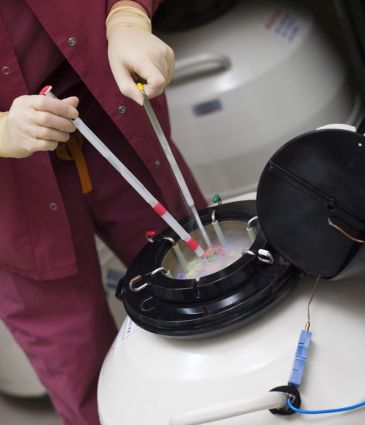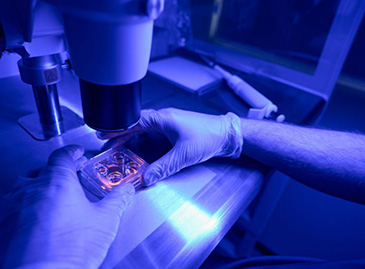
Genetic Testing in IVF
In vitro fertilization (IVF) has revolutionized reproductive medicine, offering hope to couples facing infertility challenges. This assisted reproductive technology involves fertilizing eggs with sperm outside the body and implanting the resulting embryo into the uterus.
Genetic testing in IVF
has become a pivotal tool for ensuring healthy pregnancies. Preimplantation Genetic Diagnosis (PGD) has long been a cornerstone in this endeavor, offering insights into the genetic makeup of embryos before implantation. The latest and most comprehensive version of PGD is known as Next Generation Sequencing (NGS).
This article aims to elucidate the significance of PGD and spotlight the advancements by NGS, focusing on how these technologies enhance the success rates of IVF and promote the birth of healthy infants.
Genetic Testing in IVF: When and Why is it Done?
Genetic testing in IVF is typically done to identify genetic abnormalities in embryos before they are implanted in the uterus. This is especially relevant for couples with a known genetic condition or a history of recurrent pregnancy loss.
By screening embryos for genetic abnormalities, couples can make informed decisions about which embryos to transfer, increasing their chances of a successful pregnancy and reducing the risk of passing on genetic disorders to their children.
Genetic testing is typically performed during the blastocyst stage, around day five or six after fertilization, when the embryos have reached a more advanced developmental stage.
What is Preimplantation Genetic Diagnosis (PGD)?
Preimplantation Genetic Diagnosis (PGD) is a method designed to prevent the transmission of genetic disorders to offspring by assessing embryo cells before pregnancy. Through the examination of embryo DNA, physicians can identify potential defects. For couples worried about their children's health, PGD, particularly within in vitro fertilization (IVF) programs, offers assurance.
During the IVF process, embryos undergo genetic screening, and only those free of defects are implanted in the uterus. This screening, known as Preimplantation Genetic Screening (PGS), increases the likelihood of a healthy pregnancy.
PGD testing minimizes the risk of unsuccessful IVF programs and enhances the chances of a healthy pregnancy. Istanbul Med Assist, a leading medical company in Turkey, boasts extensive expertise in PGD. Each test is conducted by at least two certified embryologists, ensuring confirmation of results. Utilizing state-of-the-art techniques, Istanbul Med Assist performs PGD with a "fresh cycle," eliminating the need to freeze genetic material.
Next Generation Sequencing (NGS): The Evolution of PGD
NGS represents the latest and most advanced iteration of PGD. Unlike traditional methods, NGS uses the most up-to-date techniques of human genome sequencing (reading of genetic information) for testing embryos and opens new diagnostic possibilities.
It analyzes the entire genomic content of embryos with unprecedented accuracy and efficiency. It provides physicians with a unique opportunity to help couples exposed to an increased risk of genetic abnormalities in the fetus. This is the first solution of this kind in the world.
This comprehensive approach identifies a broader range of genetic abnormalities, offering a more detailed and nuanced understanding of the embryo's genetic health. The precision and breadth of information NGS provides empower healthcare professionals to make more informed decisions, ultimately enhancing the chances of a healthy pregnancy for couples undergoing PGD.
Who Can Benefit from Genetic Testing?
Couples with a History of Genetic Disorders:
NGS is especially valuable for couples with a family history of genetic conditions. If one or both partners carry genes that may lead to disorders, NGS allows for identifying embryos without these genetic abnormalities, increasing the chances of a healthy pregnancy.
Individuals with Known Genetic Conditions:
If either partner has a known genetic disorder, NGS provides a powerful tool to assess embryos for that specific condition. This enables couples to make informed decisions about which embryos to implant, minimizing the risk of passing on the genetic condition to their child.
Previous IVF Failures or Miscarriages:
For couples who have experienced previous IVF failures or miscarriages, NGS can offer insights into potential underlying genetic issues. Screening embryos comprehensively helps identify factors that may have contributed to previous challenges, improving the likelihood of a successful pregnancy.
Advanced Maternal Age:
As women age, the risk of embryo chromosomal abnormalities increases. NGS is particularly beneficial for women of advanced maternal age, allowing for a thorough examination of embryos to identify any chromosomal abnormalities, enhancing the chances of a successful pregnancy.
Structural Chromosomal Abnormalities:
Couples with structural chromosomal abnormalities, such as translocations, may benefit significantly from NGS. This technology can pinpoint embryos with balanced chromosomal arrangements, reducing the risk of miscarriage and improving the overall success of IVF.
In essence, NGS opens doors for a wide range of individuals and couples, providing a more comprehensive understanding of embryos' genetic health. Targeting specific genetic concerns and tailoring the approach to individual circumstances contributes to more successful and healthier pregnancies in assisted reproductive technologies.
Common Anomalies Addressed by NGS
Chromosomal Abnormalities
Down Syndrome (Trisomy 21):
NGS meticulously examines the chromosomal makeup of embryos, enabling the identification of conditions such as Down syndrome. This chromosomal anomaly, characterized by an extra copy of chromosome 21, is a common focus of NGS screening.
Edwards Syndrome (Trisomy 18) and Patau Syndrome (Trisomy 13):
NGS extends its reach to uncover abnormalities in chromosomes 18 and 13, aiding in detecting Edwards and Patau syndromes, respectively. These conditions, though rarer than Down syndrome, pose significant health challenges for infants.
Single Gene Disorders
Cystic Fibrosis:
NGS allows for the targeted assessment of specific genes associated with single-gene disorders like cystic fibrosis. Couples carrying a recessive gene for this condition can make informed decisions about embryo implantation to prevent the inheritance of the disorder.
Sickle Cell Anemia:
By examining the presence of abnormal hemoglobin genes, NGS assists in detecting the risk of sickle cell anemia, particularly relevant for couples with a family history of this genetic blood disorder.
Structural Chromosomal Abnormalities
Translocations:
Couples with structural chromosomal abnormalities, such as translocations, can benefit significantly from NGS. This technology can pinpoint embryos with balanced chromosomal arrangements, reducing the risk of miscarriage and improving the overall success of IVF.
Aneuploidies
Monosomy and Trisomy:
NGS excels in detecting aneuploidies, conditions where embryos have abnormal chromosomes. Monosomy (missing a chromosome) and trisomy (having an extra chromosome) can lead to developmental issues, and NGS helps identify and select embryos with the correct chromosomal count.
Mitochondrial DNA Abnormalities
Mitochondrial Disorders:
NGS goes beyond nuclear DNA and can assess mitochondrial DNA abnormalities. Mitochondrial disorders can impact energy production within cells, and NGS aids in recognizing embryos with potential mitochondrial concerns.
Conclusion
In conclusion, the integration of genetic testing in IVF, specifically through the evolution of PGD into NGS, marks a significant stride in reproductive medicine. The enhanced capabilities of NGS empower couples to make informed choices and significantly reduce the risk of hereditary conditions in their offspring.
As technology continues to advance, the synergy between IVF and genetic testing holds promise for further improving the success rates of assisted reproductive technologies and bringing joy to families worldwide.
For an initial consultation, we advise you to contact Istanbul Med Assist for personalized guidance on navigating the intersection of IVF and genetic testing. Our experienced team of fertility specialists understands the unique challenges individuals and couples may face on their journey to parenthood.
- Addiction ( 27 )
- Bariatric ( 2 )
- Cardiology ( 10 )
- Check up ( 47 )
- Ear Nose & Throat ( 1 )
- Eye Care ( 2 )
- General Surgery ( 3 )
- Gynecology ( 6 )
- Hematology ( 2 )
- IVF ( 19 )
- Neurosurgery ( 5 )
- Oncology ( 10 )
- Orthopedics ( 8 )
- Physiotherapy ( 1 )
- Plastic & Beauty ( 7 )
- Stem Cells & Longevity ( 19 )
- Transplantation ( 4 )
- Urology ( 7 )







